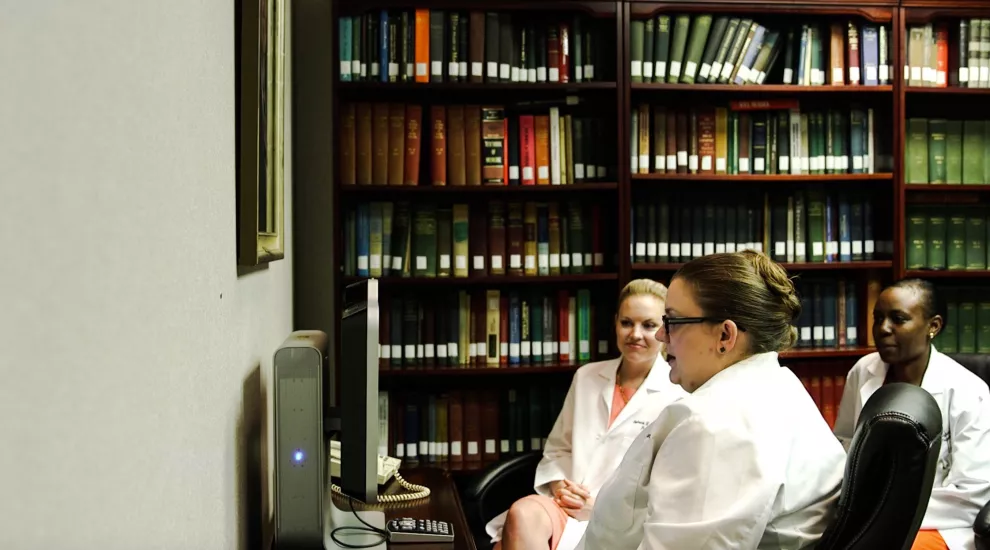
“In psychiatry, there’s that big part, what we call the therapeutic alliance, being able to interact with the patient, being able to make the patient feel comfortable, make that eye contact,” says Isabella Adjinah, a child and adolescent psychiatry fellow at the University of South Carolina School of Medicine.
Isabella Adjinah is in her fifth year of the fellowship. During her third year, she participated in a newer residency rotation with the South Carolina Department of Mental Health (DMH) and their telepsychiatry program. The program uses telehealth, which is the use of technology to deliver care over a distance, to provide psychiatric care in emergency departments.
At this point, Adjinah feels comfortable with a psychiatric interview, but when she first started using telehealth to interview patients through video conferencing, she did not know what to expect.
Adjinah says, “I remember some of the things I thought were ‘well, how will that work?’”
The video aspect was easy. "We’re used to using a lot of electronics these days,” says Adjinah.
There is a room with a camera, a remote, and a television. Someone teaches residents how to use the equipment, and they get used to it by the first or second time.
“It is unique. It’s not something I’ve experienced before, but once you get the hang of it, you forget the video aspect of it and you are able to focus on the patient,” says Adjinah.
It did not take her long to get used to the equipment, and Adjinah says getting used to interviewing a patient through a camera did not take long either, “the patient will come in and you’ll introduce yourself to the patient. You’ll talk about some of the limits in confidentiality and then you’re interviewing the patient. You’re talking to them about what led to their coming to the hospital. You’re basically asking the same questions as you would if you were in the hospital.”
Most recently, University of South Carolina School of Medicine residents have been able to work with DMH as a part of their medical training. Residents have the opportunity to participate in DMH’s telepsychiatry program, with a remote in hand.
Stephanie Hrisko also attends the University of South Carolina School of Medicine. As a third year resident, she will not use telehealth until later this year, but that has not stopped her from thinking about it.
“Whenever I first heard about telehealth, I was a medical student and I thought, ‘how can you effectively treat patients and not even be in the same room?’” says Hrisko, a psychiatry resident at the University of South Carolina School of Medicine.
While Hrisko had similar reservations as Adjnah, she says she does see the need for telehealth technology in psychiatry. In her clinic, sometimes patients may wait as long as months for an appointment.
“I see this as a way of using innovative technology and a way to provide even more care to people. It provides a way for us to care for people who aren’t able to come into our clinic,” says Hrisko.
Dr.Meera Narasiman with University of South Carolina School of Medicine says their program is unique. Not only do residents receive a hands-on experience, they achieve experience through a partnership that has proven outcomes.
“Just to be a part of having the experience and the exposure, not just looking at it from a clinical care perspective, but also being able to gather some quality outcomes, and also being educated on the different aspects of telehealth, I think, truly provides them that 360 you need, to enrich their education experience, and to be able to pursue that, as they graduate from their prospective training programs,” says Narasimhan.
Narasimhan says the Department of Mental Health set to address a mental health crisis in the 2000s, and ended up improving access to care and remedying over-crowded emergency departments. She works closely with DMH to measure those outcomes and she is excited to involve medical trainees with the success of the telepyschiatry program.
“It’s amazing to see that many are passionate about rendering care to individuals who, at this state, don’t have access to care. The same thing goes for trainees. They are truly excited to be exposed to this,” says Narasimhan.
As for the students, they are quickly picking up the technology and continue to seek information on how telehealth practices could be useful to them.
“A lot of what we do in psychiatry is talking to people and observing their behaviors. Just having a camera allows us to be able to provide care to people. To be able to see someone and talk to them, it’s not in person, but it is face-to-face,” says Hrisko.

